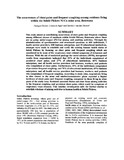The occurences of chest pains and frequent coughing among residents living within the Selibe-Phikwe Ni-Cu mine area, Botswana

View/
Date
2005Author
Ekosse, G.
De Jager, L.
Van den Heever, D.J.
Publisher
AJOL http://www.ajol.info/index.php/ajhs/article/view/30799/23130Type
Published ArticleMetadata
Show full item recordAbstract
This study aimed at establishing occurrences of chest pains and frequent coughing among different classes of residents within Selibe Phikwe, Botswana where there are on going nickel-copper mining and smelting activities. Through the administration of questionnaires and structured question to 600 individuals, 7 health service providers, 200 business enterprises, and 30 educational institutions, attempts were made to establish and verify the existing human health status at Selebi Phikwe by focusing on chest pains and frequent coughing which are considered to be some of the respiratory tract related symptoms of sicknesses and diseases. With the aid of statistical package of social sciences (SPSS), interpreted results from respondents indicated that 33% of the individuals complained of persistent chest pains, and 27% of educational institutions, 45% business enterprises, and all health service providers had learners, workers, and patients who complained of chest pains. Furthermore, 49% of the individuals complained of persistent frequent coughing; and 70% of educational institutions, 45% business interprises, and all health service providers had learners, workers, and patients who complained of frequent coughing. According to study sites, respondents living in sites closest to the mine and smelter/concentrator plant reported a higher incidence of chest pains and frequent coughing, compared to those living in other parts of the study area. Residents associated fumes and dust from mining activities to the frequent coughing and persistent chest pains, which could be symptoms of respiratory tract diseases. This baseline investigation calls for further studies to establish relations of mining activities to human health at Selebi Phikwe.
